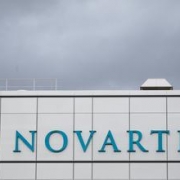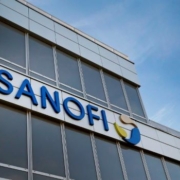Novartis 2023: Prioritizing pure-play
Following a year of transformation, Novartis is laser-focused on its goals.
By Maria Fontanazza • [email protected]
Lichstrasse 35, CH-4056, Basel, Switzerland
+41-61-324-1111 • novartis.com
| Financial Performance | ||||
| 2022 | 2021 | 1H 2023 | 1H 2022 | |
| Revenue | $50,545 | $51,626 | $26,575 | $25,312 |
| Net income | $6,955 | $24,018 | $4,611 | $3,914 |
| Diluted EPS | $3.19 | $10.71 | $2.20 | $1.77 |
| R&D Expense | $9,996 | $9,540 | $5,320 | $4,818 |
|
All figures are in millions of dollars, except EPS. |
||||
Best-selling products
All sales are in millions of dollars.
2022 sales
- Cosentyx $4,788
- Entresto $4,644
- Promacta/Revolade $2,088
- Gilenya $2,013
- Tasigna $1,923
- Lucentis $1,874
- Tafinlar + Mekinist $1,770
- Jakavi $1,561
- Zolgensma $1,370
- Xolair $1,365
- Sandostatin $1,238
- Kisqali $1,231
- Ilaris $1,133
- Kesimpta $1,092
- Galvus Group $859
- Gleevec/Glivec $745
- Exforge Group $743
- Diovan Group $652
- Kymriah $536
- Afinitor/Votubia
1H 2023 sales
- Entresto $2,915
- Cosentyx $2,348
- Promacta/Revolade $1,130
- Tafinlar + Mekinist $954
- Tasigna $938
- Kisqali $908
- Kesimpta $873
- Jakavi $849
- Lucentis $811
- Xolair $716
- Sandostatin $660
- Ilarus $644
- Zolgensma $620
- Gilenya $501
- Pluvicto $451
- Exforge Group $370
- Galvus Group $358
- Diovan Group $313
- Lutathera $299
- Gleevec/Glivec $289
Outcomes Creativity Index Score: 32
- Manny Awards — 2
- Cannes Lions — 5
- Clio Health — 1
- Creative Floor Awards — 10
- LIA: Pharma/Health & Wellness – N/A
- MM+M Awards — 10
- One Show — 4
Following its new strategic approach to growth announced last year, Novartis is squarely focusing its attention on the Innovative Medicines business: cardiovascular, immunology, neuroscience, solid tumors, and hematology. The company has established several in-market products and pipeline candidates within these five core therapeutic areas, and they are poised for significant growth. In its Q2 2023 update, Novartis pointed to the prioritization of three emerging platforms – gene and cell therapy, radioligand therapy, and xRNA – via investment in R&D capabilities and manufacturing scale. The company is focused on growing the geographic regions of the United States, China, Germany, and Japan.
Novartis has identified three main strategies key to its growth: giving renewed attention to delivering high-value medicines while emphasizing launch excellence and maintaining a healthy pipeline across its core therapeutic areas; delivering returns through achieving operational excellence and improved financials; and strengthening its foundation of people, data science, technology, and trust.
“2022 was a year of transformation for Novartis,” said company CEO Vas Narasimhan, M.D. “After more than $100 billion in acquisitions and divestitures over the last several years, our structural transformation from a diversified healthcare conglomerate into a focused, innovative medicines company will be largely complete after the planned spin-off of Sandoz in 2023.”
In mid-September Novartis held its Extraordinary General Meeting where its shareholders approved the proposed 100 percent spin-off of Sandoz, the company’s generics and biosimilars business. The spin-off is planned for October 4 and will be implemented through the distribution of a dividend-in-kind of Sandoz shares to Novartis shareholders, and of Sandoz American Depositary Receipts (ADRs) to Novartis ADR holders, each of whom will receive one Sandoz Share for every five Novartis Shares and one Sandoz ADR for every five Novartis ADRs. Novartis expects that the spin-off will be tax neutral for Swiss tax and U.S. federal income tax purposes. Sandoz will be listed on the SIX Swiss Exchange, with an American Depositary Receipt (ADR) program in the United States. The ADRs will not be listed on a U.S. national securities exchange.
A notable leadership change at the company was the resignation of Chief Commercial Officer Marie-France Tschudin, also president of the company’s Innovative Medicines International business. After nearly seven years in a commercial leadership position, Tschudin announced she would be leaving the company and also be stepping down from the company’s executive committee. On September 6, Novartis announced the appointment of AbbVie exec Patrick Horber, M.D., to the position of president, International. “[Horber] is a proven leader with deep experience enabling commercial performance on a global scale, and I am confident he will catalyze our growth journey as Novartis enters our next chapter as a fully focused innovative medicines company,” Narasimhan said.
Financial & product performance
“Our growth drivers and rich pipeline continue to provide confidence in our mid-term growth outlook, highlighted by upcoming milestones for Kisqali [ribociclib], Pluvicto and iptacopan,” said Narasimhan in commenting on the company’s Q2 2023 performance alone. The strength of the company’s balance sheet allowed Novartis to initiate an up-to $15 billion share buyback to be completed by year-end 2025, following completion of previously announced share buyback in June 2023, while still having the ability to pursue strategic acquisitions.
Novartis reported its first half of 2023 net sales at $26.6 billion (up 5 percent, 7 percent cc), driven by volume growth of 15 percentage points, price erosion of 3 percentage points, and the negative impact from generic competition of 4 percentage points. Operating income was $5.8 billion (14 percent, 28 percent cc), mainly driven by higher sales.
First-half 2023 net income rose 18 percent (32 percent cc) to $4.6 billion, primarily as a result of higher operating income. Earnings per share (EPS) grew faster than net income, benefiting from lower weighted average number of shares outstanding, coming in at $2.20 (24 percent, 39 percent cc). Higher sales drove operating income up 9 percent (16 percent cc) to $9.1 billion; core operating income margin was 34.2 percent of net sales, increasing by 1.2 percentage points (2.4 percentage points cc).
Due to higher core operating income, Novartis reported core net income at $7.4 billion (11 percent, 19 percent cc). Core EPS was $3.54 (17 percent, 25 percent cc), also growing faster than core net income and benefiting from lower weighted average number of shares outstanding. In addition, free cash flow amounted to $6 billion (23 percent), versus $4.9 billion in the prior year period, driven by higher net cash flows from operating activities.
The company’s Innovative Medicines first-half 2023 net sales rose 5 percent (8 percent cc) to $21.8 billion (U.S. sales $8.6 billion, ROW sales $13.2 billion), with volume contributing 16 percentage points to growth. The strong sales performance was thanks to continued positive performance from Entresto (sacubitril/valsartan), Kesimpta (ofatumumab), Pluvicto, and Kisqali, but was partly offset by generic competition for Gilenya. Generic competition had a negative impact of 5 percentage points; pricing had a negative impact of 3 percentage points.
Sandoz first-half 2023 net sales rose 4 percent (8 percent cc) to $4.8 billion, and volume contributed 12 percentage points to growth. Pricing had a negative impact of 4 percentage points. The company reported that sales growth was mainly driven by Europe at $2.7 billion (11 percent, 14 percent cc) and benefited from strong volume growth driven by continued momentum from prior year launches, “a strong cough and cold season,” and its biosimilars business. Global sales of biosimilars grew 12 percent (15 percent cc) to $1.0 billion and was also driven by growth outside of the United States.
Novartis raised 2023 full year guidance as a result of strong momentum in the first half of this year. Group sales are expected to grow by high single digits, and group core operating income is expected to grow in the low double digits.
More than a dozen products in the Novartis portfolio ranked on the Med Ad News Top 200 Prescription Medicines by 2022 Global Sales: Cosentyx (secukinumab), Entresto, Jakavi (ruxolitinib), Xolair (omalizumab), Lucentis (ranibizumab), Promacta (eltrombopag)/Revolade, Gilenya, Tasigna (nilotinib), Tafinlar (dabrafenib) + Mekinist (trametinib), Zolgensma (onasemnogene abeparvovec), Sandostatin, Kisqali, Ilaris (canakinumab), and Kesimpta.
Novartis highlighted several products that were key drivers in the company’s Q2 2023 performance. Its heart failure drug Entresto was up 37 percent (cc) to $1.15 billion, with its growth being attributed to high demand and the adoption of guideline-directed medical therapy across regions. However, Enbrel is one of 10 drugs that made the Centers for Medicare & Medicaid Services’ (CMS) first list of drugs covered under Medicare Part D selected for price negotiation. CMS will publish the agreed-upon negotiated prices for the drugs by September 1, 2024, and the prices will go into effect on January 1, 2026.
On September 1 Novartis filed a lawsuit against CMS, stating that the drug price-setting provisions of the Inflation Reduction Act are unconstitutional, will negatively impact patients well into the future, and place the future of innovative medicine in jeopardy. “More specifically, the drug price-setting provisions in the IRA represent an unconstitutional taking of pharmaceutical manufacturers’ private property and would impose excessive and crippling fines on any pharmaceutical company that refuses either to participate in the supposedly voluntary ‘negotiations,’ or to accept CMS’s purported ‘maximum fair price’ (MFP) for a particular drug at the end,” Novartis said in a company news statement. “The provisions also force the company to endorse views with which it profoundly disagrees, in clear violation of Novartis’ rights under the First Amendment.”
In July Novartis also noted its move to appeal to the U.S. Court of Appeals for the Federal Circuit to uphold the validity of the company’s patent covering Entresto and combinations of sacubitril and valsartan. “No generics have tentative or final approval in the U.S. Any commercial launch of a generic Entresto product prior to the final outcome of Novartis combination patent appeal, or ongoing litigations involving other patents, may be at risk of later litigation developments,” Novartis stated in its Q2 2023 update.
Other Q2 2023 product highlights are as follows. Best-seller Cosentyx grew 1 percent (cc) to bring in $1.27 billion in sales, as demand continued across key regions, offset by U.S. revenue deduction. As a result of increased demand and strong access, Kesimpta soared 105 percent (cc) to $489 million. Kisqali’s performance was boosted by increasing recognition of consistent overall survival and quality of life benefits, realizing 66 percent (cc) growth to hit $493 million. As its sales grew across all regions, Scemblix (asciminib) brought in $106 million in sales, as the drug helped to address an unmet need in chronic myeloid leukemia. Lutathera (lutetium Lu 177 dotatate) sales grew 75 percent (cc), mainly in the United States and Japan due to increase demand, reaching $150 million.
Pluvicto is enjoying strong demand, bringing in $240 million, and the company is planning for more growth after receiving approval for expanded manufacturing capacity at its facility in Millburn, New Jersey. Novartis expects that the site will “contribute meaningfully to supply and sales in the third quarter.” Additional manufacturing sites in Indianapolis, which could potentially open by the end of 2023, and a site in Zaragova, Spain, which will supply the EU market, are expected to bring a capacity of at least 250,000 doses of Pluvicto annually in 2024 and beyond.

Leqvio is an injectable prescription medicine and is the first and only small interfering RNA (siRNA) therapy to lower LDL-C.
Following its U.S. launch in and additional markets, Leqvio (inclisiran) jumped 249 percent (cc) to $78 million. The drug was also helped along as access hurdles were removed and medical education efforts improved. In July, FDA expanded the Leqvio label, with the indication updated to primary hyperlipidemia including heterozygous familial hypercholesterolemia (HeFH), and included less restrictive language for use for statin therapy, a broader population from ORION-11, and the removal of several adverse reactions from safety section. In late August, Novartis reported new long-term data from ORION-8, a Phase III open-label extension of ORION-9, ORION-10, ORION-11, and ORION-3 trials. The data showed that with twice-yearly dosing, Leqvio, in addition to statin therapy, provides consistent low-density lipoprotein cholesterol reduction beyond six years in patients with atherosclerotic cardiovascular disease(ASCVD), increased risk of ASCVD or HeFH. ORION-8 is the largest clinical trial completed to date with Leqvio.
Promacta/Revolade increased 11 percent (cc) to $583 million, growing across all regions, driven by more use in chronic immune thrombocytopenia and as first-line and/or second-line treatment for severe aplastic anemia. Piqray/Vijoice experienced 54 percent (cc) growth, with sales hitting $130 million, driven by the indication expansion into PIK3CA-related overgrowth spectrum. Jakavi brought in $435 million (11 percent cc), with sales growing in the Emerging Growth Markets, Europe, and Japan, and the strong demand in myelofibrosis and polycythemia vera. Novartis characterizes the Emerging Growth Markets as all markets except for the United States, Canada, Western Europe, Japan, Australia, and New Zealand. Overall growth in this market was up 15 percent (cc), with Innovative Medicines up 16 percent for Q2 2023.
Product approvals & pipeline updates
The most recent review of the Novartis pipeline data shows more than 130 projects currently in progress in the categories of biosimilars, cardiovascular, global health, hematology, immunology, neuroscience, ophthalmology, respiratory and allergy, and solid tumors. 2023 saw some key regulatory and pipeline updates from Novartis.

During Q2 2023, FDA approved the Cosentyx UnoReady pen, a 300-mg dosage strength for subcutaneous administration to treat moderate-to-severe plaque psoriasis, active psoriatic arthritis, and active ankylosing spondylitis.
Cosentyx received EU approval for moderate-to-severe hidradenitis suppurativa and FDA approval for its UnoReady pen, a 300-mg dosage strength for subcutaneous administration to treat moderate-to-severe plaque psoriasis, active psoriatic arthritis, and active ankylosing spondylitis. Entresto received EU approval for pediatric heart failure, and the approval supports the extension of regulatory data protection in Europe to November 2026.
Tafinlar + Mekinist received the first and only FDA approval for treating pediatric patients one year of age and older with low-grade glioma (LGG) with a BRAF V600E mutation who require systemic therapy. In addition, the agency approved liquid formulations, a move that marked the first time a BRAF/MEK inhibitor has been developed in a formulation suitable for patients as young as one year of age. LGG is the most common form of pediatric brain cancer. “It is more important than ever to test for genetic mutations in patients living with low-grade glioma. This FDA approval may offer new hope to pediatric patients living with BRAF V600E low-grade glioma,” said Roger Packer, M.D. senior VP of the Center for Neurosciences and Behavioral Medicine at Children’s National Hospital, in a Novartis news release. “This has the potential to change the way healthcare providers treat these pediatric patients, offering a significant advancement compared to chemotherapy.”
In August the European Commission endorsed a previous recommendation from the European Medicine Agency’s (EMA) Committee for Medicinal Products for Human Use (CHMP) to revoke the conditional marketing authorization (MA) for Adakveo (crizanlizumab). As a result, Novartis is removing crizanlizumab from the EU/EEA market. The decision to revoke the MA was based on review of crizanlizumab in the Phase III STAND study; Novartis stated that the STAND study results did not suggest any new safety concerns with the drug. Crizanlizumab is still FDA approved for the reduction in frequency of vaso-occlusive crises (pain crises) in adults and pediatric patients aged 16 years or older with sickle cell disease.
In May the EMA accepted the marketing authorization applications for the Sandoz proposed biosimilar denosumab for regulatory review. The two applications include all indications covered by the reference medicines Prolia and Xgeva for treating conditions that include osteoporosis in postmenopausal women and in men at increased risk of fractures, treatment-induced bone loss, prevention of skeletal related complications in cancer that have spread to the bone, and giant cell tumor of the bone.
Kisqali hit some key innovation milestones during Q2 2023. The Phase III NATALEE trial showed that ribociclib plus a non-steroidal aromatase inhibitor (NSAI), compared to NSAI alone, significantly lowered the risk of cancer recurrence in a broad population of patients with hormone receptor-positive/human epidermal growth factor receptor 2-negative (HR+/HER2-) early breast cancer (EBC) regardless of stage, menopausal, or nodal status. The results were also consistent across all secondary efficacy endpoints, with a trend for improvement in overall survival. The safety profile was favorable at 400 mg with low rates of symptomatic adverse events. Novartis presented the promising results at ASCO 2023 in June. A few months later, in mid-September, the company released more positive patient-reported outcomes data from the trial. The data showed that a broad population of patients with stage II and III HR+/HER2- EBC maintained health-related quality of life (HRQoL) during treatment with Kisqali plus endocrine therapy.
Novartis presented five-year data on Kesimpta at the American Academy of Neurology in April. The ALITHIOS open-label extension study, in relapsing multiple sclerosis patients, showed that patients treated earlier and continuously with Kesimpta had fewer disability worsening events and low brain volume change versus those who started on teriflunomide and were later switched to Kesimpta. Treatment with Kesimpta continued to be well tolerated with no new safety signals identified over the treatment period. “These longer-term data continue to reinforce the favorable safety profile of Kesimpta, as well as its ability to slow disease progression, supporting its earlier use in people with relapsing multiple sclerosis,” said Victor Bultó, president, Innovative Medicines US, Novartis. “Novartis remains committed to the multiple sclerosis community in our continued study of Kesimpta and to supporting those living with MS and their families throughout their journey.”
Within its oncology and hematology portfolio, Novartis released updated data for investigational oral monotherapy iptacopan in complement-inhibitor-naïve (including anti-C5 therapies) adults with paroxysmal nocturnal hemoglobinuria (PNH). The Phase III APPOINT-PNH trial met its primary endpoint with about 92.2 percent of patients (95 percent CI: 82.5, 100) achieving a 2 g/dL or more hemoglobin-level increase from baseline without the need for blood transfusions after the 24-week core treatment period. Secondary endpoints also showed clinically meaningful benefits.
Based on a benefit-risk assessment, Novartis discontinued the NIS793 program in metastatic pancreatic ductal adenocarcinoma. The Phase II study of NIS793 (spartalizumab) in metastatic colorectal cancer is continuing. Novartis also ended the MBL949 study of GDF-15 (growth differentiation factor 15) due to lack of efficacy.
In September Novartis made the decision to discontinue the development of GT005 (PPY988) in geographic atrophy secondary to dry-age-related macular degeneration. While no new safety signals were identified, the move was made based on a recommendation from the independent data monitoring committee following an overall benefit risk assessment of available data from the program studies, which concluded futility criteria had been met.
Acquisitions & partnerships

In August Novartis completed the acquisition of clinical-stage biopharma Chinook Therapeutics, which focuses on precision medicines for kidney diseases.
In August Novartis completed the $3.5 billion acquisition of Chinook Therapeutics, a clinical-stage biopharmaceutical company that focuses on precision medicines for kidney diseases. The deal is in line with the Novartis strategy to focus on innovative medicines and adds two high-value, late-stage assets in development for IgA nephropathy: atrasentan (an oral endothelin A receptor antagonist, in Phase 3) and zigakibart (an anti-APRIL monoclonal antibody, entering Phase III).
Strengthening its neuroscience business, Novartis acquired the San Diego-based, pre-clinical stage biotech company DTx Pharma in July. The deal expands Novartis capabilities in RNA-based therapeutics, adding DTx’s FALCON platform to the company’s siRNA toolkit. It also includes DTx-1252, a potential therapy for Charcot-Marie-Tooth disease type 1A (CMT1A), two additional preclinical programs for other neuroscience indications, and DTx’s fatty acid ligand conjugated oligonucleotide (FALCON) platform. Under the agreement terms, Novartis made a $500 million upfront payment, with additional payments planned upon completion of pre-specific milestones.
In late June Novartis signed an agreement with Bausch + Lomb to divest its “front of eye” ophthalmology assets. The deal includes Xiidra (dry eye disease), SAF312 (libvatrep) in development for chronic ocular surface pain, OJL332 (TRPV1 antagonist in pre-clinical development), and seven rights for use of the AcuStream delivery device. Under the agreement terms, Novartis will receive $750 million related to anticipated future sales for Xiidra, SAF312, and OJL332. The deal is subject to customary conditions, and Novartis expects that it will close in the second half of 2023.
Sandoz and Just-Evotec Biologics established a partnership to develop and manufacture multiple biosimilars, supporting the expansion of the current Sandoz pipeline to 24 assets and the continued development of the early-stage pipeline.

Just ahead of its split with Novartis, Sandoz announced an exclusive development and commercialization agreement with Samsung Bioepis involving the biosimilar SB17 ustekinumab.
In September Sandoz announced a development and commercialization agreement with Samsung Bioepis, which gives Sandoz exclusive rights to commercialize the biosimilar SB17 ustekinumab in the United States, Canada, EEA, Switzerland, and the UK. The biosimilar is a competitor to Stelara, a monoclonal antibody medication to interleukin (IL)-12/23 for treating autoimmune disorders, including Crohn’s disease, plaque psoriasis, psoriatic arthritis, and ulcerative colitis.
Humanitarian efforts
“As we continue innovating for patients, millions around the world are still without proper access to health care. Translating the latest science into lasting progress requires us to work with healthcare systems and other stakeholders to advance access for underserved patients in low- and middle-income countries, while also tackling access barriers in some of the wealthiest countries in the world,” Narasimhan said. “In the U.S., for example, we expanded our 10-year Beacon of Hope initiative, which seeks to address racial disparities in health care, including by increasing diversity among clinical trial participants and investigators. We also pledged to invest $250 million in R&D for the treatment of malaria and neglected tropical diseases, building on our decades-long commitment to global health priorities. We continue to make progress in other aspects of our ESG agenda, including reducing greenhouse gas emissions from our own operations by nearly half since 2016.”
In continuing its path to build trust, the Novartis Giving & Volunteering Team announced in September that it received the Association of Corporate Citizenship Professionals Corporate Social Impact Team of the Year Award 2023. The award recognizes a team of Environmental, Social, & Governance (ESG) and/or CSR practitioners whose collaborative and innovative approach to a project or program generated significant business results for the company and/or social impact in the community. Novartis was honored for its work in scaling its response to the global refugee crisis by going beyond monetary and medicine donations to offer an innovative approach that is holistic and sustainable. This includes a commitment to hire at least 150 people and train at least 150 refugees over the next three years, according to the company.
February marked the first anniversary of the war in Ukraine. Novartis has delivered more than 1.5 million packs of medicines, worth about $38 million in medical aid, to maintain the supply to those who rely on the drugs in both Ukraine as well as the border areas where refugees are seeking help. The company also made an initial $3 million donation to charities that support refugees and displaced people in Ukraine and bordering countries. Employees have donated $2.2 million.
Novartis also recently made a pledge to provide essential medicines to the people affected by the devastating earthquake in Morocco on September 9.
“As a company, we are committed to supporting the humanitarian effort and have pledged a donation of $1 million,” Novartis said in a statement. “Our priority is to ensure this support reaches those most in need, and we are currently working with Novartis’ non-profit partners. Furthermore, Novartis has initiated an employee donation campaign in partnership with non-profit organizations, and we will match the funds donated by our employees. In coordination with local health authorities, Novartis is also preparing to donate vital medicines to patients with urgent needs and is locally offering paid hours to associates volunteering to those in need.”












